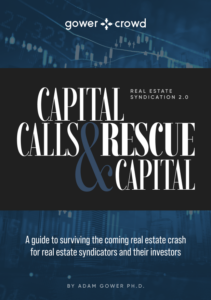The Ultimate Guide on How to Get Started in Real Estate Development
By Adam Gower Ph.D.
A Morgan Stanley survey revealed that 77% of US millionaire investors own real estate while 35% own a share of a Real Estate Investment Trust (REIT). Compared to other alternative assets, real estate is by far the category with the highest level of investment.
Real estate investors do sometimes buy turnkey properties, but more often they develop properties. The appeal of real estate development is the potential for higher operating profits during ownership and larger capital gains upon sale.
It’s risky, but also rewarding when successful. Many of these investors work with real estate development companies to reach their expected ROI.
To get into real estate development, you need to understand the processes involved. There are three general stages you’ll go through: pre-development, construction, and post-development. Before looking at these stages a little more closely, it’s a good idea to refresh your understanding of what real estate development actually is and how you do it.
What is Real Estate Development?
“Real estate development is the process of creating value by making tangible improvements to real property.” -Ben Bulloch & John Sullivan
When you’re developing real estate, you’re either building new structures, modifying existing ones, or generally improving any piece of real estate to increase its value. Real estate includes land and temporary or permanent structures occupying that land.
What Requirements Are There to Become a Developer?
The process of becoming a developer varies from state to state, but the fundamental necessities remain the same.
Education
As a real estate developer, you will wear many hats- so a broad knowledge and experience base is vital. In most states, you do not need to acquire a specific degree or professional certification to become a developer, but having a degree in related fields will help immensely in your journey. These include, but are not limited to, civil engineering, urban planning, finance, business management, or a business real estate degree. Some schools, like The University of Southern California, for example, offer masters in real estate development that can also stand you in good stead to get started.
Professional Experience
As important, if not more so, as your formal education is your "on the ground" experience in the field. A background working in real estate, as an agent, broker, analyst, etc., will prepare you for being a developer- but other professional fields have their value as well. Careers in finance, sales, construction, and many other related areas can all be relevant to success as a developer.
Many of my students have started working as commercial real estate brokers where they learn the ins and outs of both buyer and seller side dynamics. From there they migrate to assisting sponsors in raising either debt or equity for deals. This can be one of the best ways to get educated in real estate development because to do that well, you must understand contracts and proformas like the back of your hand – and, combined, these two form the DNA of any development business.
Connection
Your social capital, aka your professional and personal connections, will also have an outsized impact on your prowess as a developer. Simply put, the more people you know, and have good relationships with in a market, the more effective you will be. This includes people like brokers, who can help you find deals, title agents to help you through transactions, attorneys to assist with development-related legal matters, and anyone else who can contribute to making your process more efficient and effective.
Related: 7 Steps to Raising Equity Online
How to Get into Real Estate Development?
There is a fairly straightforward process for getting started with real estate development:
Get Some Basic Knowledge
You don’t want to enter any kind of investment without understanding the basics of the market. Learn the ins and outs of real estate as best you can before trying to invest in it. No degree necessary, although it doesn’t take long to get a real estate license for a thorough cover of the topic. If you’ve worked in real estate in any capacity, you probably already have basic understanding.
Build a Team
Unless you plan to do everything yourself, find team members who can make it happen. A trustworthy team includes other developers, legal staff, architects, engineers, finishers, day workers, and more.
Some teams can be built as you go, or you can work alongside an established developer to start off.
Find a Property or Project
Find a project that meets your investment criteria and makes sense for your team’s capabilities. To start out, you can join into an existing project for more experience or seek out your own property.
Arrange Financing
You do need capital to purchase the property that you’re going to develop, though you don’t have to pay for it on your own. Working with investors gives you more opportunities for commercial properties, although you’re likely to need an experienced partner to earn investor trust.
Congratulations! You’ve gotten into real estate development! Unfortunately, getting in is the easy part. Making it a worthwhile investment is where the challenge comes. Here’s more information about getting into real estate development.
Get access to our FREE weekly newsletter exclusively covering the latest updates from the real estate crowdfunding world
Phases in Real Estate Development
The real estate development process includes three main stages. There’s work to be done before these stages, including vetting opportunities and purchasing a property. Finding and vetting a property deal is a topic that needs its own space. Talking about the 3 stages of property development, we’re looking at how to proceed after making a purchase.
Each stage in the real estate development process is important. You can’t skip steps or try to do them out of order. If you don’t follow the logical order, you’re likely to make mistakes. Mistakes lead to losses. By minimizing mistakes and only proceeding with well thought out, reasonable decisions, you’re more likely to end up with a net gain than a net loss.
After you’ve finalized a property purchase, you’ll begin with pre-development before moving on to construction and post-development.
Jumping ahead to construction without going through the planning and analyzing phase is a disaster waiting to happen, just as you can’t go through the planning phase and hope good results come in post-development if you do shoddy work in the construction phase.
Get access to our FREE weekly newsletter exclusively covering the latest updates from the real estate crowdfunding world
"Each phase is there for a reason. Go through the process the right way if you want to maximize your chances of a good result."
Pre-Development
Start pre-development with a thorough analysis of your property. You may have been able to inspect before the purchase, but now you need to analyze with a critical eye to determine how you can truly add value to the property. Hopefully, you’ll have a few ideas based on your buying criteria.
Pre-development will likely be one of the longest stages of the real estate development process because you want to plan out all your moves. Raise and address every issue you can, so you can handle it before you start constructing.
Understanding Your Market
Like a farmer planting a seed, you want to ensure that you choose fertile ground in which to grow your "crop." Different markets will work for different investing strategies- for instance, for more stable, but less lucrative returns you may want to invest in more expensive markets with low-cap rates, for more risk and more returns, you can look at less expensive secondary or even tertiary areas with higher cap rates.
In most cases, you want to find markets with positive population growth, a diverse employment base, and a well-educated populace. Being close to urban cores or economic centers is also a major plus.
Finding a Property
Once you've settled on a market, it is time to find a property. Just as in the residential property markets, digital listings are incredibly popular, with sites like Loopnet, Costar, the main commercial real estate platforms that offer retail, shopping, office, industrial, self-storage, and other property types for sale.
That said, despite the growing influence of digital platforms, much of the real estate business is still face to face, and brokers and can be excellent sources of off-market deals. Your third option is to reach out to commercial property owners within your designated market to see if they are willing to sell. This approach takes a bit more effort, but can be very rewarding due to the potential to scoop up a property before other investors get a chance to bid on it.
Vetting a Property
In this phase, pay attention to things like:
-
- Property zoning
- Local government policies
- Construction design
- Tenant negotiations
- Cost analysis & redesigns
- Market analysis
- Community public input, when required
"Take your time to do this phase well. Although you want to get through it quickly to avoid excessive holding costs, you don’t want to overlook something that will end up eroding your profit margins."
Before you give the construction team the order to proceed, you should be confident that everything is ready to go. If you don’t feel confident in your plans, keep planning or get a second opinion from a trusted source.
Construction
After you give the go-ahead to the construction team, your job is to monitor them closely. You may not be the construction expert, but you can recruit an expert to help you ensure things are moving along smoothly. This is the most expensive stage of the process and there’s rarely ever a way to correct a mistake without paying for it.
If you didn’t do your pre-development work thoroughly, you’re likely to run into more problems during construction. If you did cover the potential issues well, construction should move forward in a relatively predictable way. There’s always a chance that something can go wrong, even if you’ve planned well.
As part of your monitoring, you should be asking questions like:
- Are all regulations being followed?
- Is everything up to code?
- Is the team sticking to the budget?
- Are things happening on schedule or not?
Payment to construction teams is done based on milestones throughout the project. Each time a milestone is reached, more of the money is released until everything is done. The final payment happens after you’ve inspected and approved the complete project.
Whether you’re building a new development from the ground up or renovating/modifying an existing building or complex, you need to keep a close eye on what’s happening. If you’re not knowledgeable enough to know when something’s wrong, hire someone who is to keep track of what’s happening on site. This is critical for ensuring the building process goes smoothly and the crew is doing things right.
Substandard work is easier to see when it’s being done than after things are finished and refined for the building’s opening. If corners are being cut, something will fail before its lifetime has finished, costing you a lot down the line.
Post-Development
You have two main choices after construction is complete. During the post-development stage, you can either open the building for business to lease and manage it, or you can sell it. Once you complete the development project, you may also be able to use it as collateral for a larger project loan.
If you’re going to lease and manage the property, you should already have some clients lined up. Large CRE spaces should have business tenants lined up before the building is completed, especially if the property needs an anchor store or if it’s a larger complete space for a single business tenant.
Real estate development projects that take on outside investors may decide to lease and manage the building until investors have had a chance to make back most or all their initial investment. This is a common practice with multi-family properties, as tenants are typically easier to find and retain. When the property only needs renovations or modifications, existing tenants may stay throughout the purchase and construction process if possible.
Asset management starts the moment the construction is complete. You are responsible for maintaining the property, performing necessary repairs, and for general upkeep so the asset will remain in good shape. At this point, you are responsible for all taxes, loan payments, and other fees whether the property is earning money or not.
If you choose to sell the property instead of leasing it, you may be able to turn a quick profit and begin your next project sooner. With this route, you’re more likely to owe higher capital gains taxes, but the ability to bounce off to a new project makes it great for anyone uninterested in long-term lease management.
Tips to Keep in Mind
Here are a few things to think about when you’re in the midst of the development process.
Communicate effectively.
Many of our problems in life, and in business, can be chalked up to miscommunication or a lack of communication. One of your leading roles as a developer is to be a facilitator and communicator, working with investors, builders, brokers, finance folks, and others. Availability, especially during normal work hours, is imperative. People want to know they can reach and rely on you.
Meeting your professional contacts where they are is also integral. This means contacting others through multiple platforms, including email, text messaging, phone calls, and whatever else you need to do to stay connected.
Don’t make rash decisions.
Emotional decisions can be a killer in the real estate markets. The same goes for rash, unplanned decisions that some make without thinking of the eventual consequences. Be deliberate and fastidious in how you approach every aspect of development, from sourcing properties, to seeking financing, to closing the deal.
It can be tough to put your emotions to the side, especially in some of the highly competitive, highly stressful situations that come with being a real estate developer- but remember the words of Teddy Roosevelt- "speak softly and carry a big stick, and you will go far."
Maintain an honor code.
This one goes without saying, but we will. Your reputation and your legal ability to do business rests on acting with integrity and honor in all of your dealings. Now, this does not mean you need to take every call or meeting or pay a dime more than you should for a property. It means you should follow the golden rule and treat others the way you would want to be treated.
The real estate world is small, and even if folks do not face legal consequences for immoral or unethical behavior, potential investors, real estate professionals, and buyers and sellers will hear about it, one way or another.
Start at the Beginning
If you’re new to real estate development, knowledge is your first step. Learn more about each stage of the process, from pre-development analysis to your post-development options. There’s no disadvantage to learning more about your potential field of investment in preparation for an upcoming project.
If you have only just started in real estate development, have completed no deals, have no email list, but know you want the freedom and wealth being a real estate developer brings, then I suggest your first step is to start evaluating deals so you can recognize a good one when you see it.
Here’s where you should start. You’ll learn everything you need to know – the different types of real estate, different development strategies, how real estate cycles influence the market, and all about due diligence.
If you want to find deals and raise money for them so you can start your real estate development business, then learning how to conduct due diligence so you can pitch your deals better to investors is a great place to start.
If you’ve already purchased one or more real estate project and are seeing more opportunities than you can finance, then now is the time to start building your investor network so you can finance all your next deals quicker.
You’ve already got some momentum; now start finding and educating prospects about what you’re doing so you can build an email list of people to pitch to when you’re ready to raise money for your next deal.
This is what we build for private clients all the time – it’s called the Investor Acquisition System and you can access the entire program right here so you can find prospects, and convert them into being deep pocketed, repeat investors in your deals.
If you are a seasoned pro with multi-cycle experience, a substantial portfolio, a decent deal pipeline, and find yourself spending too much time raising equity capital because you’re still doing it in-person, then it’s time you put technology to work for you.
The wonderful thing about doing this is that you’re not going to be doing anything different than you’re already doing and, guess what, you’ll never have to sit through investor meetings again.
Sounds crazy I know, but I lay the whole thing out for you in this white board workshop where I personally show you exactly what it takes for you to transform your equity raising into a fully automated, capital raising machine so you can find new investors while increasing commitments from your existing network.






